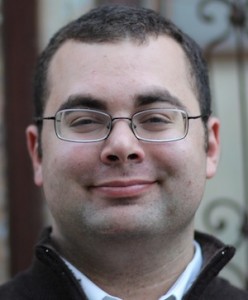Ari Ne’eman was diagnosed with Asperger’s syndrome at the age of 12. He did not have an easy childhood, being forced to leave his Solomon Schechter day school and, later, being expelled from Camp Ramah.
He is now head of the Autistic Self-advocacy Network (ASAN), and serves as one of President Barack Obama’s appointees on the National Council on Disability. Earlier this year, he received the Ruderman Family Foundation’s $100,000 Morton E. Ruderman Award, which “recognizes an individual who has made an extraordinary contribution to the inclusion of people with disabilities in the Jewish world and the greater public, and is based on past achievements and the potential for future contributions to the field.”

In 2006, Ne’eman co-founded ASAN. “Too often in conversations about autism policy or public discussion, researchers and family members are given precedence over autistic voices,” he told the Independent about the need for the organization. “This is due to a tendency not to recognize that a self-advocate perspective is distinct and different from those of family members, providers or researchers.”
The goal of ASAN is to ensure that those on the autism spectrum are represented in the public discourse and have their own collective voice. “People with disabilities are often perceived as incapable of representing themselves or as being unreliable in being the narrators of our own experience,” he said. “Really, both of those perceptions are very inaccurate and unfortunate.
“Unfortunately, society has certain perceptions about people with disabilities – in particular of autistic people and people with developmental disabilities. This often leads them to seek out the voices of our family members or service providers rather than hearing our own voices.”
According to Ne’eman, many people believe autism is a recent epidemic or a tragedy and, as a result, focus on advocacy related to research around causation and cure. ASAN believes the focus should be on services, supports and rights protection throughout their lifespan.
“Many families have been exploited by groups that seek to sell pseudoscientific cures predicated on the idea that autism is somehow connected to vaccination, which has been very thoroughly discredited,” he said. “From our point of view, there’s a need to really debunk those myths and communicate more accurate information to families.”
Ne’eman said that different autism diagnoses can be given to the same person by different doctors, and that these can also differ depending on when in their life a person is diagnosed. “This is partly because, even though there’s tremendous diversity on the autism spectrum, there aren’t clear dividing lines when it comes to different diagnoses,” he said. “We have this idea that there’s this thing called
‘Asperger’s’ and this separate thing called ‘autism.’ But, in fact, there is no clear dividing line between the two. What we have is a single, very diverse autism spectrum.”
ASAN includes people across the spectrum. For example, they have members who need augmentative communication technology to communicate (cannot speak). “We also have members and leaders, like myself, who do [speak],” said Ne’eman. “We have some who can talk in some contexts, but not in others. Some members have intellectual disabilities or various forms of cognitive or behavioral challenges.”
The network has invested largely in leadership development, and is active in lobbying state governments to change the funding of disability services to a more inclusive model. “We are in the process of expanding our work with respect to bringing people to a more integrated form of service provision, and supporting people out of institutions and group homes,” said Ne’eman.
ASAN advocates for students with disabilities, whose treatment varies greatly between districts and schools.
“As a matter of federal law, students with disabilities have the right to receive a free and appropriate education in a least restrictive environment,” said Ne’eman. “There’s a real need for a stronger emphasis on supporting students with disabilities in the general education classroom.
“In adulthood, people with disabilities also have a right to receive services in the most integrated setting under the Americans with Disabilities Act,” he continued. “In the U.S. today, there are 13 states that have eliminated institutionalization for people with developmental disabilities. I’ve seen significant positive outcomes as a result. When you get down to it, people aren’t more disabled in New Jersey, which has a lot of institutions, than they are in Oregon, which has no institutions.”
ASAN also promotes equal wages for people with disabilities. “Right now, approximately 200,000 people with disabilities in the U.S. are paid less than minimum wage under the Fair Labor Standards Act,” said Ne’eman. “If you look at the provision that allows for subminimum wage, it dates back to the 1930s, when there was one set of assumptions about people with disabilities. Today, 25 years after the Americans with Disabilities Act, we have different assumptions.”
Ne’man said that the Ruderman Award “was particularly an honor because of the importance of the foundation’s work in the Jewish community.”
He said, “Growing up, like many Jews with disabilities, I experienced challenges in being accepted in Jewish communal life. Many people with disabilities have to leave Jewish day school and other Jewish communal settings because of an unwillingness to provide accommodations.”
Ne’eman put a significant amount from the award toward a new disability rights-related project that he is not yet prepared to discuss, noting, “Hopefully in the coming year it will become visible.”
Rebeca Kuropatwa is a Winnipeg freelance writer.
